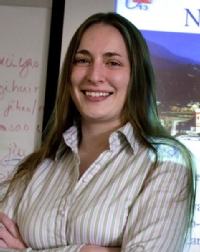Whitehead Receives DOE Office of Science Early Career Research AwardUH Physicist One of 68 Promising Researchers Selected in Nation

Lisa Whitehead, assistant professor of physics at University of Houston, is one of 68 U.S. scientists selected to receive the Department of Energy (DOE) Office of Science’s Early Career Research Award. The five-year awards are designed to bolster the nation’s scientific workforce by providing support to exceptional researchers during the early career years.
The research awards also provide an incentive for scientists focusing on research areas that are a high priority for the DOE and the nation. Applicants direct their proposals to one of the DOE Office of Science's six major program offices: Advanced Scientific Computing Research, Basic Energy Sciences, Biological and Environmental Research, Fusion Energy Sciences, High Energy Physics, and Nuclear Physics.
About 850 university- and national laboratory-based applicants applied for the program. Selection was based on peer review by outside scientific experts. Whitehead is one of only three researchers selected from the state of Texas.
“This is a significant honor for Dr. Whitehead and the University of Houston,” said Dr. Mark A. Smith, dean of UH’s College of Natural Sciences and Mathematics. “Many scientists do their most formative work in their early career. This DOE support will positively impact her ability to focus on her research into neutrinos and antineutrinos and will give her well deserved national and international attention.”
Whitehead’s research proposal, “Precision Measurement of Electron Antineutrino Disappearance in the Daya Bay Experiment,” was selected for funding by the DOE’s Office of High Energy Physics. The Daya Bay Neutrino Experiment is a multi-national collaboration in south China, involving around 230 researchers from 38 institutions in the U.S., China, and Europe.
Whitehead has been involved with the Daya Bay Experiment since 2007. Recent experimental observations at Daya Bay revealed the disappearance of electron-type antineutrinos from nuclear reactor cores at the Daya Bay Power Plant. Massive detectors buried in the mountains adjacent to the nuclear reactors are used to measure the interactions of antineutrinos.
Neutrinos are one of the fundamental particles that make up the universe. Free of electric charge, they are created as a result of certain types of radioactive decay or from nuclear reactions such as those that take place in the sun or in nuclear reactors. They can travel great distances through matter without being affected by it or harming it. There are three types of neutrinos: electron, muon and tau neutrinos. Each type has a corresponding antiparticle, called an antineutrino.
Whitehead’s research will focus on background interactions caused by cosmic muons that can interfere with the antineutrino measurements, with the goal of improving the precision of the antineutrino disappearance measurement.
To be eligible for an Early Career Research Program award, a researcher must have received a Ph.D. within the past ten years and be an untenured, tenure-track assistant or associate professor at a U.S. academic institution or a full-time employee at a DOE national laboratory.
A list of the DOE Office of Science Early Career Research Award recipients, their institutions and abstracts of their research projects is available at http://science.energy.gov/early-career/.
- Kathy Major, College of Natural Sciences and Mathematics